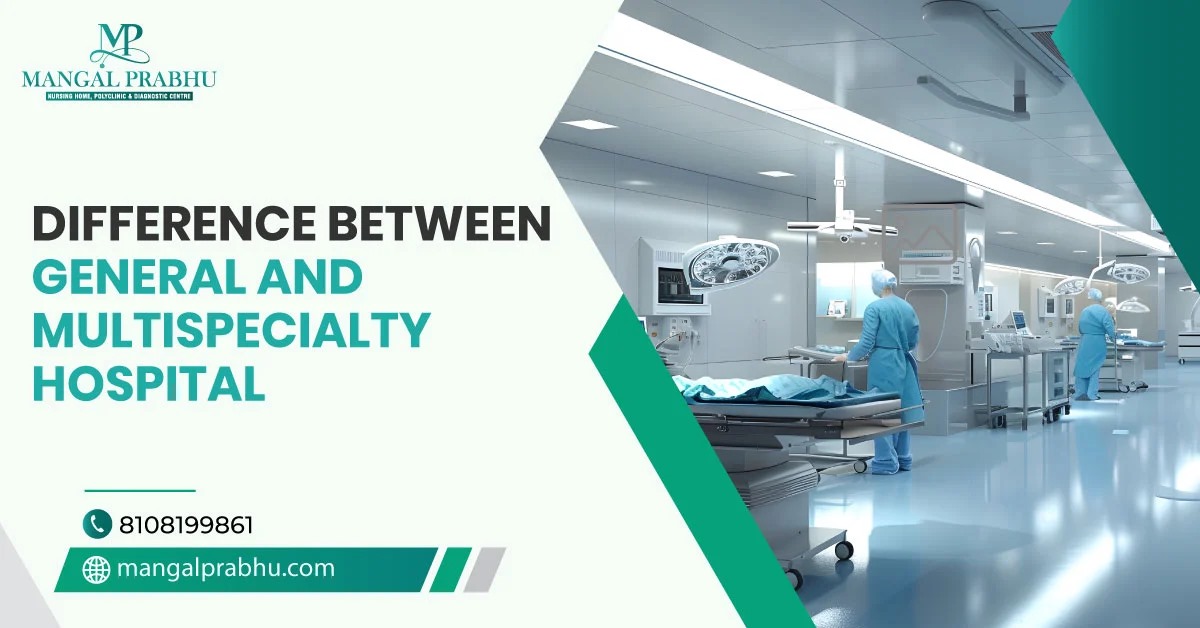
Choosing the best hospital can be overwhelming. With so many options, it’s often hard to determine which hospital is most suitable for you. Hospitals in India are categorized into two main types: general and multispecialty.
As the name suggests, multispecialty hospitals in Navi Mumbai offer all kinds of medical services under one roof. This may include different departments for cardiovascular, neuro, cancer, and other patients. On the other hand, general hospitals offer basic healthcare services, which may cover surgical treatments, outpatient procedures, diagnostic services, and so on.
Let’s understand the difference between general and multispecialty hospitals.
General Hospitals
General hospitals offer primary healthcare services without specializing in any specific medical field. The hospitals have general practitioners who can address common infections, less severe illnesses, and minor surgical procedures. Simply put, a general hospital is where you should go if you have common illnesses and small injuries that may not require specialized care.
Multispecialty Hospitals
Multispecialty hospitals offer advanced treatment for a particular disease. As mentioned earlier, these hospitals have multiple departments that address issues related to different medical conditions, like urology, neurology, cancer, cardiovascular illnesses, and the list goes on. They have medical practitioners specializing in chronic illnesses. From an accurate diagnosis to proper treatment, these hospitals can seamlessly cater to all medical issues.
Key Differences Between General and Multispecialty Hospitals
Let’s take a look at the common differences between these hospitals.
| Basis | General Hospital | Multispecialty Hospital |
| Medical Expertise | You can find general practitioners who offer primary care for common illnesses, like flu, infection, or injuries. | They have specialists qualified and trained to address serious cases. |
| Equipment | Offer basic medical facilities and diagnostic services, like bloodwork and X-rays. | Equipped with advanced imaging tests, such as MRI and CT scans. They also have ICUs and advanced facilities for post-operative care. |
| Patient Care | Cater to common health issues. | Patients with severe and chronic medical issues are referred to the multispecialty hospitals. |
| Size | General hospitals are in small towns and rural areas. They are small and have fewer departments. | These hospitals have multiple departments, each with practitioners specializing in different medical fields. |
Advantages of General Hospitals
- Wider Accessibility: General hospitals are available in local areas, including small cities, making services accessible to patients who can’t travel long distances.
- Reasonable Prices: General hospitals are your best option if you are looking for affordable hospitals in Navi Mumbai.
- Emergency Care: Most general hospitals have the tools and equipment to handle emergency cases before referring them to multispecialty hospitals.
Cons
- Lack of advanced facilities and infrastructure
- Do not have specialists for chronic health conditions.
Advantages of Multispecialty Hospitals
- One-stop solution: Offer comprehensive medical assistance in one place
- Specialists: These hospitals are staffed with specialists, including physicians, surgeons, and consultants.
- Advanced Diagnostics: Multispecialty hospitals have advanced diagnostic tools to diagnose different health conditions accurately.
- Large Infrastructure: These hospitals have ventilators, dialysis machines, operation rooms, and other advanced facilities to handle emergency cases and offer post-operative care to the patient.
Cons
- These are expensive
- Inaccessible to people from small towns
